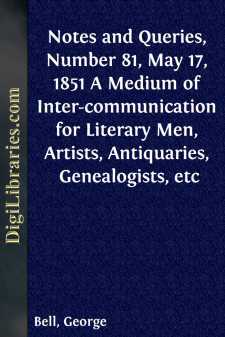Categories
- Antiques & Collectibles 13
- Architecture 36
- Art 48
- Bibles 22
- Biography & Autobiography 813
- Body, Mind & Spirit 142
- Business & Economics 28
- Children's Books 17
- Children's Fiction 14
- Computers 4
- Cooking 94
- Crafts & Hobbies 4
- Drama 346
- Education 46
- Family & Relationships 57
- Fiction 11829
- Games 19
- Gardening 17
- Health & Fitness 34
- History 1377
- House & Home 1
- Humor 147
- Juvenile Fiction 1873
- Juvenile Nonfiction 202
- Language Arts & Disciplines 88
- Law 16
- Literary Collections 686
- Literary Criticism 179
- Mathematics 13
- Medical 41
- Music 40
- Nature 179
- Non-Classifiable 1768
- Performing Arts 7
- Periodicals 1453
- Philosophy 64
- Photography 2
- Poetry 896
- Political Science 203
- Psychology 42
- Reference 154
- Religion 513
- Science 126
- Self-Help 84
- Social Science 81
- Sports & Recreation 34
- Study Aids 3
- Technology & Engineering 59
- Transportation 23
- Travel 463
- True Crime 29
Sort by:
by:
George Bell
ON TWO PASSAGES IN "ALL'S WELL THAT ENDS WELL." Among the few passages in Shakspeare upon which little light has been thrown, after all that has been written about them, are the following in Act. IV. Sc. 2. of All's Well that Ends Well, where Bertram is persuading Diana to yield to his desires: "Bert. I pr'ythee, do not strive against my vows: I was compell'd to her; but...
more...
by:
George Bell
NOTE UPON A PASSAGE IN "MEASURE FOR MEASURE." The Third Act of Measure for Measure opens with Isabella's visit to her brother (Claudio) in the dungeon, where he lies under sentence of death. In accordance with Claudio's earnest entreaty, she has sued for mercy to Angelo, the sanctimonious deputy, and in the course of her allusion to the only terms upon which Angelo is willing to remit...
more...
PREFACE. Cynics may ask, how many have profited by the innumerable proverbs and maxims of prudence which have been current in the world time out of mind? They will say that their only use is to repeat them after some unhappy wight has “gone wrong.” When, for instance, a man has played “ducks and drakes” with his money, the fact at once calls up the proverb which declares that “wilful waste...
more...
by:
John Bartlett
SHAKESPEARE. TEMPEST. Act i. Sc. 2. There's nothing ill can dwell in such a temple:If the ill spirit have so fair a house,Good things will strive to dwell with 't. Act i. Sc. 2. I will be correspondent to command,And do my spiriting gently. Act ii. Sc. 2. A very ancient and fishlike smell. Act ii. Sc. 2. Misery acquaints a man with strange bed-fellows. Act iv. Sc. 1. Our revels row are ended:...
more...
A 1 Abilities—No man's abilities are so remarkably shining, as not to stand in need of a proper opportunity, a patron, and even the praises of a friend, to recommend them to the notice of the world. —Pliny. Absence, with all its pains,Is by this charming moment wip'd away. 3 Abuse is the weapon of the vulgar. —Goodrich. It is told of Admiral Collingwood that on his travels he carried a...
more...
by:
George Bell
Notes. ILLUSTRATIONS OF CHAUCER, NO. VI. Unless Chaucer had intended to mark with particular exactness the day of the journey to Canterbury, he would not have taken such unusual precautions to protect his text from ignorant or careless transcribers. We find him not only recording the altitudes of the sun, at different hours, in words; but also corroborating those words by associating them with physical...
more...
by:
George Bell
The Arke of Artificial Day. Before proceeding, to point out the indelible marks by which Chaucer has, as it were, stereotyped the true date of the journey to Canterbury, I shall clear away another stumbling-block, still more insurmountable to Tyrwhitt than his first difficulty of the "halfe cours" in Aries, viz. the seeming inconsistency in statements (1.) and (2.) in the following lines of the...
more...
INTRODUCTION Although the quilt is one of the most familiar and necessary articles in our households, its story is yet to be told. In spite of its universal use and intimate connection with our lives, its past is a mystery which—at the most—can be only partially unravelled. The quilt has a tradition of long centuries of slow but certain progress. Its story is replete with incidents of love and...
more...
CAST CAPTAIN NATHAN HALECAPTAIN WILLIAM HULLGENERAL WASHINGTONBOS'NLIEUTENANT PONDSIMON CARTERLIEUTENANT DREW [BRITISH]MRS. CHICHESTERCAPTAIN MONTRESSORPROVOST MARSHAL CUNNINGHAM We present here the story of the famous Revolutionary hero and martyr, Nathan Hale. For the first scene of our sketch, let us go to General Washington's headquarters in New York City. It is early September of the...
more...
CHAPTER I THE COMING OF THE RAILWAY The Coming of the Railway—The Iron Road—The New Power—Engine and Rail—The Work of the Railway On the morning of October 6, 1829, there began at Rainhill, in England, a contest without parallel in either sport or industry. There were four entries: Braithwaite and Ericsson's Novelty.Timothy Hackworth's Sans-pareil.Stephenson and Booth's...
more...











